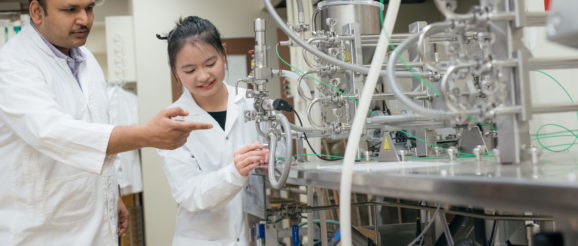B.C. government provides $2.58M to support food-processing innovation at UBC

New funding from the provincial government will allow UBC’s faculty of land and food systems to drive scientific innovation for B.C.’s food and beverage industry.
Agriculture minister Lana Popham announced today that the province will provide $2.58 million over three years for an endowment to fund the Food and Beverage Innovation Professorship.
“When I was appointed minister, I made a commitment to create more opportunities for the B.C. food and beverage processing industry and an important milestone has been reached in this commitment,” said Agriculture Minister Lana Popham. “We’re working hard to make British Columbia a leader in food processing innovation and Dr. Singh and the centre at UBC will be providing timely guidance to processors in order to drive the industry forward.”
The role of the Food and Beverage Innovation Professor at UBC will involve:
- leading research and development of food-processing innovations
- working with industry partners on applied innovation projects
- developing academic programming in food and beverage technology to produce highly qualified graduates
- serving as academic and research director for the proposed UBC Food and Beverage Innovation Centre
“The research in our faculty can directly benefit those in the community,” said Rickey Yada, dean of the faculty of land and food systems. “With the Food and Beverage Innovation Professorship, we are able to expand our support for entrepreneurs and others working in industry who have the inspiration and imagination to create groundbreaking new products, but who may not have had a scientific research partner.”
Anubhav Singh, assistant professor of food processing, will be first to take on the role.
Singh’s research explores novel food-processing techniques that are more organic and natural than past practices. He and his graduate students work with industry partners—local food producers, startup companies and small- to mid-sized food processors—to bring their techniques to the food and drinks that British Columbians consume.
The new government support will enable even more of these collaborations.
“I’m excited to solve problems that are impacting industry today. As an application-oriented scientist, my research strives to have an immediate impact in the next five years,” said Singh. “One example from our research is exploring physical interventions like pressure, vacuum, light, sound, plasma, electricity to enhance food quality & safety.”
Training, education, research and development were among the industry’s top needs identified in a 2018 survey commissioned by the Ministry of Agriculture to help guide development of the B.C. Food Hub Network. UBC will participate in this network of regional hubs for food processing and innovation, and play a key role in addressing those priorities.
